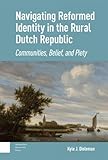Navigating Reformed Identity in the Rural Dutch Republic : Communities, Belief, and Piety / Kyle Dieleman.
Material type: TextPublisher: Amsterdam : Amsterdam University Press, [2023]Copyright date: ©2023Description: 1 online resource (264 p.)Content type:
TextPublisher: Amsterdam : Amsterdam University Press, [2023]Copyright date: ©2023Description: 1 online resource (264 p.)Content type: - 9789048550777
- 284/.2492 23//eng/20231006eng
- online - DeGruyter
| Item type | Current library | Call number | URL | Status | Notes | Barcode | |
|---|---|---|---|---|---|---|---|
 eBook
eBook
|
Biblioteca "Angelicum" Pont. Univ. S.Tommaso d'Aquino Nuvola online | online - DeGruyter (Browse shelf(Opens below)) | Online access | Not for loan (Accesso limitato) | Accesso per gli utenti autorizzati / Access for authorized users | (dgr)9789048550777 |
Frontmatter -- Table of Contents -- Acknowledgements -- Introduction -- 1 Establishing Order via National, Provincial, and Local Church Orders: “Let All Things Be Done with Decency and Order” -- 2 Establishing Authority: Electing Elders and Deacons -- 3 Establishing Confessional Identity : An “Honest Citizen, Even Though a Catholic” -- 4 Navigating Intra-Confessional Conflict: “Live at Peace with Everyone”? -- 5 Establishing Belief and Practice: Rural Approaches to Sabbath Observance -- Conclusion : Establishing and Navigating Reformed Identity in the Rural Low Countries -- Bibliography -- Index
restricted access online access with authorization star
http://purl.org/coar/access_right/c_16ec
Through an examination of Dutch Reformed church records and theological texts, Kyle Dieleman explores the local dynamics of religious life in the early modern Dutch Republic. The book argues that within the religiously plural setting of the Dutch Republic church officials used a variety of means to establish a Reformed identity in their communities. As such, the book explores the topics of church orders, elders and deacons, intra-confessional and inter-confessional conflicts, and Sabbath observance as local means by which small, rural communities negotiated and experienced their religious lives. In exploring rural Dutch Reformed congregations, the book examines the complicated relationships between theology and practice and ‘lay’ and ‘elite’ religion and highlights challenges rural churches faced. As they faced these issues, Dieleman demonstrates that local congregations exercised agency within their lived religious experiences as they sought unique ways to navigate their own Reformed identity within their small, rural communities.
Mode of access: Internet via World Wide Web.
In English.
Description based on online resource; title from PDF title page (publisher's Web site, viewed 02. Jun 2024)


